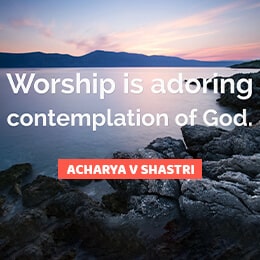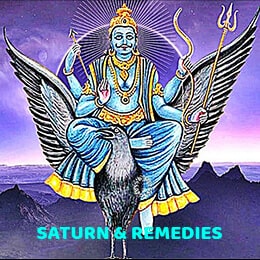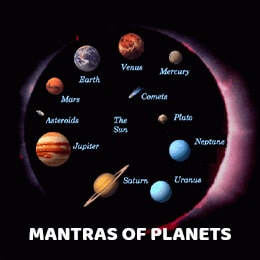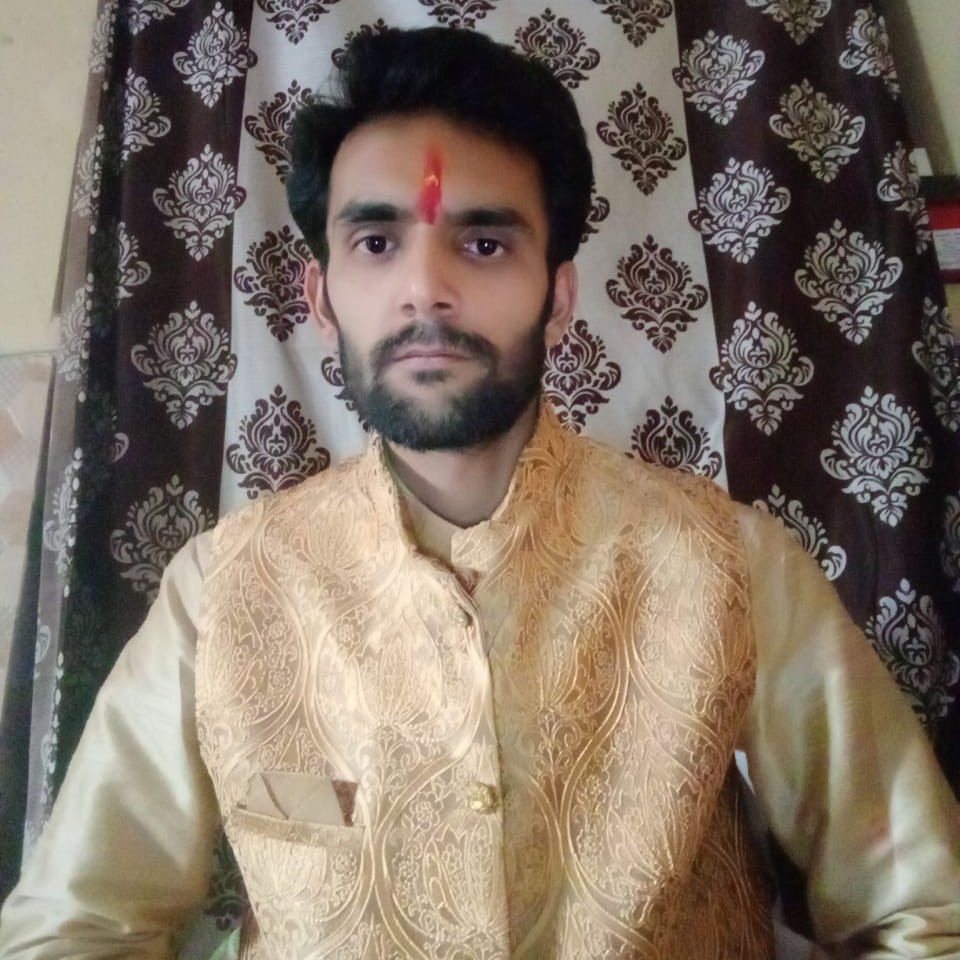Worship of the Deities Related to the Planets
All the nine planets have been associated with some deity. It is said that if the deity of a concerned planet is worshipped then the planet ceases its maleficence and bless the native with all sorts of peace, happiness and prosperity. The concerned deity should be worshipped by chanting their mantras or reciting their names abundantly.
As mentioned in the scriptures planets, their lords and the lords of constellations should be worshipped to ward off afflictions caused by them.
| Lords of Planets | ||
|---|---|---|
| Planets | Deities | Deities as mentioned in Lal Kitab |
| Sun | Agni (Fire) | Vishnu |
| Moon | Varun (water) | Shiva |
| Mars | Subrahmanya (Son of Shiva born after Ganesha) | Hanuman |
| Mercury | Mahavishnu | Durga |
| Jupiter | Indra | Brahma |
| Venus | Shachidevi (wife of Indra) | Lakshmi |
| Saturn | Brahm | Bhairon |
| Rahu | Bhairava | Saraswati |
| Ketu | Ganesh | Ganesh |
By Tara chakra, we come to know as to what result a Nakshatra will give to a native. We find out the position of Nakshatra starting right from the Janma Nakshatra.
Besides Janma Nakshatra, we also find Sampat, Vipat, Kshem, Pratyari, Sadhak, Vadha, Mitra and Atimitra. Stars related to the class of Janma, Vipat, Pratyari and Vadha do not give good results. Pooja of these stars should be performed the day they are in transit. It is certain that a person gains by worshipping Janma Nakshatra.
| Constellations along with their Deities and Planets | |||
|---|---|---|---|
| S.No. | Constellation | Deity of the constellation | Planet of the constellation |
| 1. | Ashwini | Ashwini | Ketu |
| 2. | Bharani | Kala | Venus |
| 3. | Kritika | Agni (Fire) | Sun |
| 4. | Rohini | Brahma | Moon |
| 5. | Mrigashira | Moon | Mars |
| 6. | Ardra | Rudra | Rahu |
| 7. | Punarvasu | Aditi | Jupiter |
| 8. | Pushya | Jupiter | Saturn |
| 9. | Ashlesha | Sarp | Mercury |
| 10. | Magha | Pitar | Ketu |
| 11. | Purva Phalguni | Bhag | Venus |
| 12. | Uttara Phalguni | Aryama | Sun |
| 13. | Hast | Sun | Moon |
| 14. | Chitra | Vishwakarma | Mars |
| 15. | Swati | Pawan | Rahu |
| 16. | Vishakha | Shukragni | Jupiter |
| 17. | Anuradha | Mitra | Saturn |
| 18. | Jyeshtha | Indra | Mercury |
| 19. | Moola | Nirriti | Ketu |
| 20. | Purvashadha | Jal (Water) | Venus |
| 21. | Uttarashadha | Vishwedeva | Sun |
| 22. | Shravan | Vishnu | Moon |
| 23. | Dhanishtha | Vasu | Mars |
| 24. | Shatbhisha | Varun | Rahu |
| 25. | Purva Bhadrapad | Ajaikapad | Jupiter |
| 26. | Uttara Bhadrapad | Arhibudhanya | Saturn |
| 27. | Revati | Pusha | Mercury |
There are ten deities there in all the ten organs of our body. They are as follows:
| Body Organs and Ruling Deities | ||
|---|---|---|
| S.No | Organs | Deities |
| 1. | Mouth | Agni (Fire) |
| 2. | Tongue | Varun |
| 3. | Ear | Disha |
| 4. | Nose | Ashwini Kumar |
| 5. | Hand | Indra |
| 6. | Eye | Sun |
| 7. | Genital | Mitravasun |
| 8. | Posterior part | Yam |
| 9. | Foot | Vishnu |
| 10. | Wisdom | Brahma |
Prasad should be taken by mouth to propitiate Agni. Bhajan of God (devotional songs) should be sung by tongue. Fable of God (Hari Katha) should be heard by ears. Flowers offered to the God/Goddess should be smelt with nose. Things in alms should be given by hands. Glimpse of God should be taken by eyes. Feet are meant for pilgrimage. By wisdom, God should be contemplated.
Worship of Ganesha
To start a venture, lord Ganesha is worshipped first of all so that the job undertaken might be accomplished smoothly. Lord Ganesha is propitiated before worship of a deity, performing Havan, Jap of Mantras or starting a new venture as He counters all the obstacles.
Vakratunda Mahakaya Surya Koti Samprabhah |
Nirvighnam Kuru Mc Deva Sarva Karyeshu Sarvada ||
One should make reverential salutation to deity Ganesh to propitiate Him. He should make invocation, offer Him Aasan, Padya and Arghya. He should offer Him sacred water for aachman and bath along with Panchamrit, sacred piece of cloth, Yagyonpavita (sacred thread), flowers, Dhoop, Dip, Dry Fruit and Dakshina etc. and should perform Aarti.
Recitation of Ganesha Chalisa and Ganesha Stotra should be performed besides Aarti to propitiate Ganesha.
Worship of different forms of Ganesh should be performed to have different results as mentioned below:
| Worship of different forms of Ganesh | ||
|---|---|---|
| S.No | Form of Ganesh | Results |
| 1. | Santan Ganapati | For progeny. |
| 2. | Vighnaharta Ganapati | To ward off strife and all the obstactes. |
| 3. | Vidya Pradayak Ganapati | To have knowledge and education. |
| 4. | Vivah Vinayaka Ganapati | For marriage. |
| 5. | Dhanadayak Ganapati | To gain wealth. |
| 6. | Chinta Nashaka Ganapati | To be free from worries. |
| 7. | Siddhidayaka Ganapati | To acquire Siddhis. |
| 8. | Anandadayaka Ganapati | For happiness and pleasure. |
| 9. | Vijaya Siddha Ganapati | To get rid of litigations and win them over. |
| 10. | Rinamochana Ganapati | To be free from loans. |
| 11. | Roganashak Ganapati | To be free from diseases. |
| 12. | Netritva Shakti Vikasaka Ganapati | To acquire faculty of leadership. |
Lord Ganesha is contemplated by his 12 names given below :
Vakratunda, Ekadanta, Krishnapingaksha, Gajavaktra, Lambodar, Vikata, Vighnarajendra, Dhoormavarna, Bhalachandra, Vinayaka, Ganapati and Gajanan. One, who recites these twelve names, remains free from all the obstacles.
Prathamam Vakratundam cha ekadantam Dwiteeyakam |
Triteeyam Krishnapingaksham Gajavaktram Chatur thakam ||
Lambodaram Pancham Cha Shashtham Vikatameva Cha |
Saptamam Vighnarajendram Cha Dhoomravarna Tathashtakam ||
Navamam Bhalachandram Cha Dashamam Tu Vinayakam |
Ekadasham Ganpatim Dwadasham Tu Gajananam ||
Dwadashaitani Namani Trisandhyam Yah Pathennarah |
Na Cha Vighnabhayam Tasya Sarvasiddhikaram Prabho ||
Dhana Teras Pooja
Elders in a family purchase house hold utensils and appliances for Grihalakshmi two days before Deepawali on the occasion of Trayodashi. Generally, utensils for the head of the family are bought of the metal that may prove to be favourable for him. Deep/Diyas of Ghee and oil are offered to Yama in the evening. The house is cleaned and decorated with zeal to welcome Goddess Mahalakshmi. Vaidya Dhanvantari had appeared on this day. So, Diyas are kindled to commemorate Dhanvantari. By worshipping Dhanvantari on this day, a man enjoys sound health and does not meet untimely death. Some people start worshipping Goddess Lakshmi right from this day. Lakshmi Pooja on this occasion of Dhanateras has got its own significance.
Worship of Lakshmi
In this materialistic world nothing can be accomplished without the grace of Lakshmi. People worship Lakshmi, the Goddess of wealth to gain wealth. Worship of Lakshmi on the occasion of Deepawali has got its own significance. It is performed specially on the day of Amavasya in the month of Kartika. Worship of Saraswati, Ganesha, Durga, Kuber, Ledger, Pen, Balance etc. is also performed along with that of Mahalakshmi. Ashta Siddhis dwell in different directions.
Worship of these Ashtasiddhis should be performed in the directions as mentioned below:
Om Animne Namah (east)
Om Mahimne Namah (Agnikon) (south east)
Om Garimne Namah (south)
Om Laghimne Namah (Nairritya) (South West)
Om Praptyai Namah (West)
Om Prakamyai Namah (Vayavya) (North West)
Om Ishitayai Namah (North)
Om Vashitayai Namah (1shana) (North east)
Worship of Ashta Lakshmi should also be performed the same way, i.e.
Om Adyalakshmyai Namah
Om Vidyalakshmyai Namah
Om Saubhagyalakshmyai Namah
Om Amrit Lakshmyai Namah
Om Kama Lakshmyai Namah
Om Satya Lakshmyai Namah
Om Bhoga Lakshmyai Namah
Om Yoga Lakshmyai Namah
Thus, after performing worship of Lakshmi, recitation of Lakshmi Chalisa, stotra as well as Aarti should also be performed. By doing all this, a person may enjoy prosperity throughout the year.






































